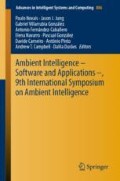Abstract
Context-awareness is central to many applications in Ambient Intelligence. The paper presents the functionality of a context reasoning engine, called CONSERT, for developing ambient intelligence applications, which builds on semantic complex event processing. The implementation of core rule processing using the DROOLS Fusion framework and the advantages gained through this approach are discussed. The resulting engine capabilities are presented for the case of recognizing activities of daily living (ADL) contained in the CASAS dataset, together with an evaluation of the obtained results.
Access this chapter
Tax calculation will be finalised at checkout
Purchases are for personal use only
Notes
- 1.
- 2.
- 3.
- 4.
GitHub link to CONSERT Model implementation: https://goo.gl/jWavX5.
- 5.
- 6.
Rules used in the CASAS ADL Normal dataset evaluation: https://goo.gl/A8zkL2.
References
Perera, C., Zaslavsky, A., Christen, P., Georgakopoulos, D.: Context aware computing for the internet of things: a survey. IEEE Commun. Surv. Tutor. 16(1), 414–454 (2014)
Bikakis, A., Patkos, T., Antoniou, G., Plexousakis, D.: A survey of semantics-based approaches for context reasoning in ambient intelligence. In: European Conference on Ambient Intelligence, pp. 14–23. Springer, Heidelberg (2007)
Bettini, C., Brdiczka, O., Henricksen, K., Indulska, J., Nicklas, D., Ranganathan, A., Riboni, D.: A survey of context modelling and reasoning techniques. Pervasive Mob. Comput. 6(2), 161–180 (2010)
Sorici, A., Picard, G., Boissier, O., Zimmermann, A., Florea, A.: CONSERT: applying semantic web technologies to context modeling in ambient intelligence. Comput. Electr. Eng. 44, 280–306 (2015)
Sorici, A., Picard, G., Boissier, O., Florea, A.: Multi-agent based flexible deployment of context management in ambient intelligence applications. In: International Conference on Practical Applications of Agents and Multi-Agent Systems, pp. 225–239 (2015)
Cook, D.J., Schmitter-Edgecombe, M.: Assessing the quality of activities in a smart environment. Methods Inf. Med. 48(5), 480 (2009)
Li, F., Sehic, S., Dustdar, S.: COPAL: an adaptive approach to context provisioning. In: IEEE 6th International Conference on Wireless and Mobile Computing, Networking and Communications (WiMob), pp. 286–293 (2010)
Ejigu, D., Scuturici, M., Brunie, L.: Hybrid approach to collaborative context-aware service platform for pervasive computing. J. Comput. 3(1), 40–50 (2008)
Gu, T., Pung, H.K., Zhang, D.Q.: A service-oriented middleware for building context-aware services. J. Netw. Comput. Appl. 28(1), 1–18 (2015)
Meditskos, G., Kompatsiaris, I.: iKnow: ontology-driven situational awareness for the recognition of activities of daily living. Pervasive Mob. Comput. 40, 17–41 (2017)
Riboni, D., Sztyler, T., Civitarese, G., Stuckenschmidt, H.: Unsupervised recognition of interleaved activities of daily living through ontological and probabilistic reasoning. In: Proceedings of the 2016 ACM International Joint Conference on Pervasive and Ubiquitous Computing, pp. 1–12 (2016)
Acknowledgement
This research was supported by the national grant PN-III-P2-2.1- 34PED.
Author information
Authors and Affiliations
Corresponding author
Editor information
Editors and Affiliations
Rights and permissions
Copyright information
© 2019 Springer Nature Switzerland AG
About this paper
Cite this paper
Trăscău, M., Sorici, A., Florea, A. (2019). Detecting Activities of Daily Living Using the CONSERT Engine. In: Novais, P., et al. Ambient Intelligence – Software and Applications –, 9th International Symposium on Ambient Intelligence. ISAmI2018 2018. Advances in Intelligent Systems and Computing, vol 806. Springer, Cham. https://doi.org/10.1007/978-3-030-01746-0_11
Download citation
DOI: https://doi.org/10.1007/978-3-030-01746-0_11
Published:
Publisher Name: Springer, Cham
Print ISBN: 978-3-030-01745-3
Online ISBN: 978-3-030-01746-0
eBook Packages: Intelligent Technologies and RoboticsIntelligent Technologies and Robotics (R0)

